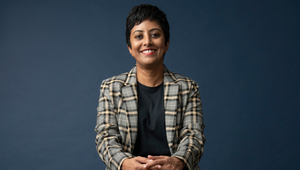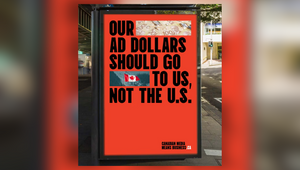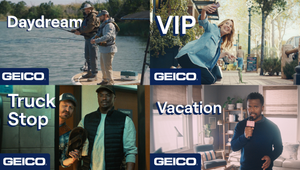
Get to Know N=5, One of 2017’s Most Successful Dutch Agencies

The Netherlands’ largest independent creative agency seems to be going through a golden era at the moment. In 2017 Amsterdam’s N=5 picked up a heap of awards. They won two of the Grands Prix at eurobest in November, and in some interesting categories too - Innovation and Integrated - as well as being named 3rd Place Independent Agency of the Year and Dutch Agency of the Year. That was the cherry on top. They had already been pronounced Lovie Agency of the Year 2017.
LBB’s Alex Reeves chatted with Thijs Bontje, senior creative / copywriter, Daniel te Lindert, senior creative / art Director and Stefan Leendertse, creative to get a feel for what they’re doing so right.
LBB> For those who don’t know, could you give us a brief history of N=5 and how it’s developed over the years?
TB> [The agency] started back in 1999. At the time they were working at another agency in Holland. This was a breakaway from that. They started out with a kind of new TV campaign at that time. There was a lot of humour involved, but the TV campaigns they did really well here were more emotional. It was quite new at that time and that was when it took off.
The first campaign was for an internet provider. And from that day to now it’s [progressed] from a real old-school TV agency to what we do now, developing not only TV campaigns but more and more technical solutions like the KPN Safe Lock or Helping Heart, or social projects like Evert_45.
DTL> We look for media-free ways to answer communication problems.
TB> We’re still an independent agency and that’s quite special, we think. It’s nice for the way we work because we can make a lot of decisions for ourselves. We don’t have to listen to bosses in the States, for example. We’re nimble and can adapt quite fast.
LBB> What does the name represent?
TB> N=5 comes from research. When they ask one person a question they call it N=1 in Holland for advertising research work. There were five founders originally, so N=5. It was a working title in the beginning. As was the logo - the equals sign. It remains to this day and it’s really good for branding.
LBB> Your website is only available in Dutch. Would you say you’re a very Dutch agency?
SL> We’re changing that at the moment by the way! We’re making a new website in English, French, even a Mandarin Chinese version. You’re right. It was a really Dutch office. The world got smaller and smaller because of the Internet and nowadays it’s a bit broader. All our case [studies] are always in English. That’s something from the past that we didn’t change like the way the name works. But we will soon have a more international website. Because we’re independent, most of our clients used to be Dutch, but we’re getting more international clients.
LBB> You’ve had quite a lot of success in awards this past year. Has that helped gain you more international attention?
DTL> I think that’s already happening. We’re talking to you! I think it’s a good thing. Especially as it’s on our agenda to broaden out a bit more. We’re not trying to conquer the world now but the ideas we think of are universal, so we could do this for international clients as well. It’s good to have the attention of a more international clientele.
LBB> You described yourself once as a “Rotterdam office in Amsterdam”. For those of us who aren’t Dutch, what does that mean?
TB> Ha! That’s a quote from a couple of years ago but what it means is… Amsterdam and Rotterdam in Holland are two different cities. They are worlds apart. Rotterdam is a harbour city with tough people. It’s a more working-class style there.
SL> It’s like party town versus a working town.
TB> The mentality in Rotterdam is like “don’t talk; work” and we like to integrate that here in Amsterdam. So it’s a nice combination.
DTL> It’s just a manner of speaking actually because there was never a Rotterdam base for N=5. It’s just a mentality.
TB> Like Newcastle in London. Something like that.
LBB> Is there anything else about your agency culture that you think is important to the way you work?
TB> We have what we call here the Swedish Model. It’s a flat organisation. No creative directors or layers. That’s pretty nice. There’s a lot of freedom in your work, a lot of responsibility for yourself. No one’s going to tell you how to do it.
DTL> It’s always a different team of planners or account people helping out and production people. It depends on what you want.
LBB> Tell us about ‘Helping Heart’. That innovation has been gaining some praise in 2017.
SL> Helping Heart started off as an independent project from our agency. We started with two insights from the Queen [of the Netherlands]: that 'Not all homeless people are on the streets begging for money for a quick win, a lot of them are trying to rebuild their life.'
That got us talking about how we’re becoming a cashless society. And how even when you carry cash there’s always a doubt about what [homeless people] are going to spend it on. On food or on an addiction? It’s a stigma that isn’t completely true but it sticks with a lot of people.
We started thinking about how we could get an alternative payment system that’s simple for people to use and really blocks out the doubt so you know they’ll spend it well. The solution for that is ‘Helping Heart’ - a payment system that makes sure every penny spent goes to the homeless people and is spent on good things. Credits can only be spent in a shelter, so you know it’s spent on a hot shower, food, and even put into a savings programme to pay for studies, or rent for a house.
It really fires people up. There are a lot of parties who’ve got involved. We’re rolling out the product in London.
LBB> It’s interesting to see, but it’s still in testing, right?
DTL> It’s an early stage technology. I think for us it’s very important to test it and do more than the average advertising gimmick. We want this to be a real solution. Not a gimmick for a client that lasts a few months. We’ve been working on it for more than a year now. It’s being developed and we’re working with financers. It’s going to be a real thing. That’s very important for us.
LBB> KPN Safe Lock is another project you’ve got in the works, but not finished yet. Can you tell us a bit about that?
SL> It’s a little bit further because we’re already making the locks. It fully works and we’ve got partnerships. So it’s going to be in stores in 2018. But it’s still a process. We’re beta testing right now with people from KPN - children and their parents. It’s the same - a real solution and a real product, not just a gimmick that’s there for a PR case study.
DTL> A lot of people don’t know but every bike in the Netherlands has a lock like what the safe lock is based on. Everybody has it, so it works.
SL> The social context on this is maybe more important than on homelessness, because it’s an international idea but in Holland there are a lot of bikes per capita. I think the most in the world. There’s more bikes than cars. And children are cycling at a really early age. When they’re four of five years old they cycle to school and they get a phone at an early age too (although that’s international).
More and more accidents are happening. I think it was 400 last year with kids really involved with their mobile phone having an accident. 12 of them were fatal and for a country of only 17 million that’s pretty heavy. It’s getting heavier and heavier.
We reached out to KPN, where there is a man who lost his son a few years ago. The media approached all the mobile service providers for them to do a campaign about this. For us, just doing a communication campaign wasn’t enough. The problem we identified, backed by research, told us that kids - even if they only have a little signal on their phones - they’re distracted. They basically can’t help it. So the only way to change it is to really solve it, not just start a communication campaign.
TB> The Dutch government works on these kinds of problems. They do communication campaigns. That’s the old-fashioned way and I think it’s really cool that KPN realised we can develop a real product that takes care of the problem at the root of the situation.
SL> The most important part of it is that they really made an effort. They realised they had to close down their network. So if you unlock your bike, the total KPN network is closed [to your phone]. There’s no messages, no incoming voice calls. It’s not easy for a big telecoms organisation to do that.
DTL> I think it takes some balls to realise that you’re part of the situation. Maybe not the problem but you can do something resolve the problem. It’s something they do really well.
LBB> Another KPN campaign you recently received accolades for was Evert_45. What about that project do you think made it such a success?
DTL> It’s two points. We reached a really hard to reach group of people - really young kids - and tried to help with the cultural problem that the stories of the Second World War die away with the people who experienced them first hand. I think we made it really relevant for these young people. And that’s something really, really hard. We were able to connect with young people and make them really feel what happened back then.
LBB> I’m guessing you don’t have any children working at the agency. How did you make sure you got the tone right?
TB> I have children myself who are eight and ten. They really like to watch YouTube videos and YouTubers. So I’m familiar with that world and the way they talk. That really helped, I think, to get the right tone of voice.
DTL> We worked with a lot of influencers and people who made their own vlogs or YouTube videos - they helped us and we consulted with them. For us it’s pretty new territory and we thought bringing in those experts would help.
The people we talked to were really involved with their fans so had a real connection with the people that we wanted to talk to. That made it a really accurate way to pick a tone of voice.
People genuinely believed he was doing this as an attempt to have a YouTube channel. It was a totally different dimension. We learnt so much from the comments we got on every video. That was the biggest learning point for us.
There was also a certain historical correctness to it. We worked with a university - a historian checking all the facts. On all ends it was checked to make sure it was effective and correct.
You hardly ever see brands with the balls to take on this subject. KPN stayed really far away from it and then at the end explained why they did it. I think that’s something they did really well.















